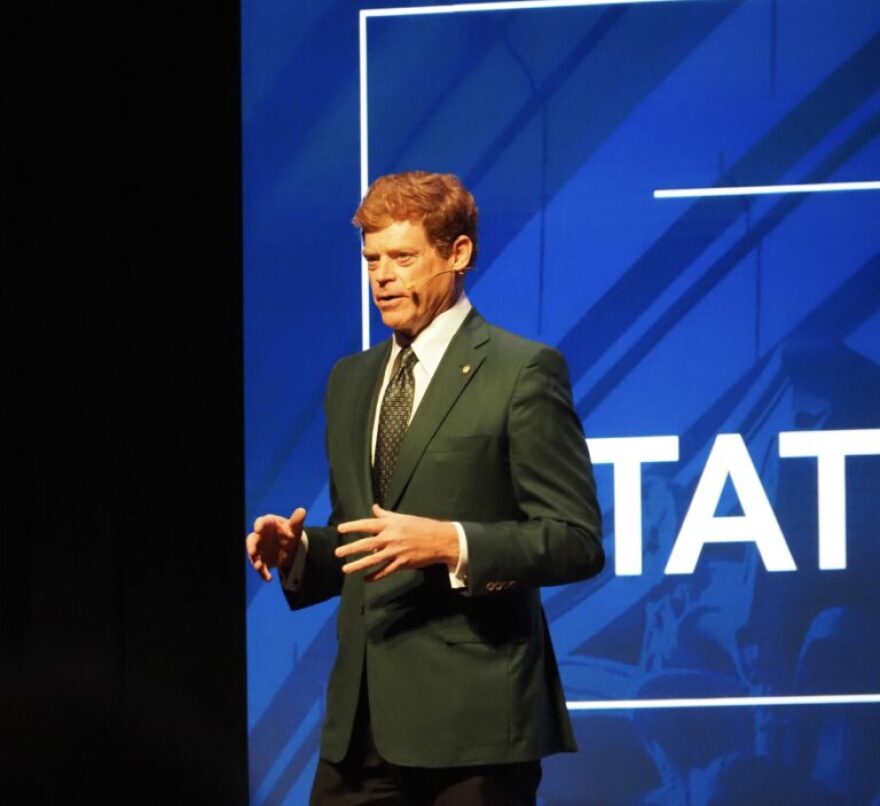Leaders of Oklahoma’s business community say the state must improve its poor literacy outcomes with major reforms, including holding back students who fall behind in reading.
State Chamber officials on Monday unveiled their latest education-focused campaign, called “Oklahoma Competes,” during a State of Business Forum. Along with supporting retention of struggling students, chamber leaders said they will urge Oklahoma lawmakers to dedicate more funding to reading coaches and other literacy initiatives.
“We’ve got to resource it right,” Rick Nagel, who leads the chamber’s executive committee, told news reporters Monday. “We’re going to have to invest some money. We can’t save our way out of this one. We’re going to have to invest in fixing this problem and be committed to it.”

The chamber, a major voice in the state’s public policy pursuits, joins a growing chorus calling for improvements to early literacy in Oklahoma, where only 27% of third graders scored proficient or advanced on the state reading test last school year.
Better reading outcomes are foundational for Oklahoma’s future workforce and the state’s ability to compete for business investment, chamber leaders said.
Third grade is widely considered a milestone year in literacy education because from fourth grade onward, a child must have mastery of basic reading skills to succeed in other school subjects, a concept known as “reading to learn.”
Oklahoma law previously required children to repeat third grade if they scored poorly on the state reading test starting in the 2013-14 school year. The state Legislature, though, added exemptions to the rule in subsequent years and ultimately did away with the requirement altogether with the Strong Readers Act in 2024.
State Chamber President and CEO Chad Warmington pointed to 2016 as a pivotal year in which Oklahoma started to shift away from tough reading regulations while Mississippi, now in the top 10 in the country for fourth-grade reading performance, continued them.
“I think the key is we were there in 2013 and 2016,” Warmington said after the chamber forum. “They stayed the course, and we didn’t. So if we go back to the structure that we had with all the new advances we have from digital learning, distance learning, broadband, AI, we can get our students to accelerate really quickly.”
Rewriting of reading laws weren’t Oklahoma’s only major changes for education in that window of time, though. Oklahoma eliminated Common Core education standards in 2014 and started developing its own academic standards, which dictate what public schools must teach in each subject.
In 2016, the state experienced a general revenue failure that resulted in cuts to school funding. The state Legislature has increased public school funding by $1.5 billion since then, with a significant amount added in the past three years, but Oklahoma still falls behind all of its bordering states in per-student spending.
Meanwhile, emergency certified teachers, once considered a stop-gap measure, are hired by the thousands every year in Oklahoma schools as an educator shortage continues.

Mississippi has spent about $15 million a year on reading reforms, including hiring literacy coaches who work with teachers to improve instruction. The state also placed greater emphasis on the phonics-based science of reading, added early childhood literacy screenings and, controversially, held back third graders who fell below a minimum standardized test score.
Oklahoma should follow Mississippi’s playbook, Warmington said.
Colleges must ensure future teachers are trained in the science of reading, he said, and the state should grow the number of literacy coaches supporting educators in the classroom. Use of AI-based literacy tools should be in use statewide to give teachers more up-to-date data on students’ progress, he said.
“And then at the end of the day, you have to have some accountability,” Warmington said. “It’s a safety net. If a student’s not reading, we can’t advance them. So, now you’ve got to go in with some more advanced tutoring to get those students to grade level and help them move on.”
Improving early childhood education and lowering class sizes must be part of the conversation, said Senate Minority Leader Julia Kirt, D-Oklahoma City.
Kirt was one of more than three dozen state lawmakers scheduled to attend the chamber’s forum.
“Third-grade retention without nuance is problematic, and that’s why it went away because we can’t overly rely on standardized tests,” Kirt said afterward. “And, we don’t want the students to turn around and get sent back to 30-kid classrooms, oversized classrooms with teachers who are emergency certified.”



